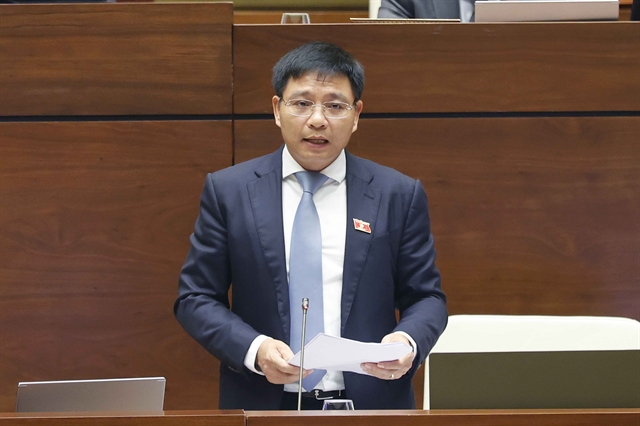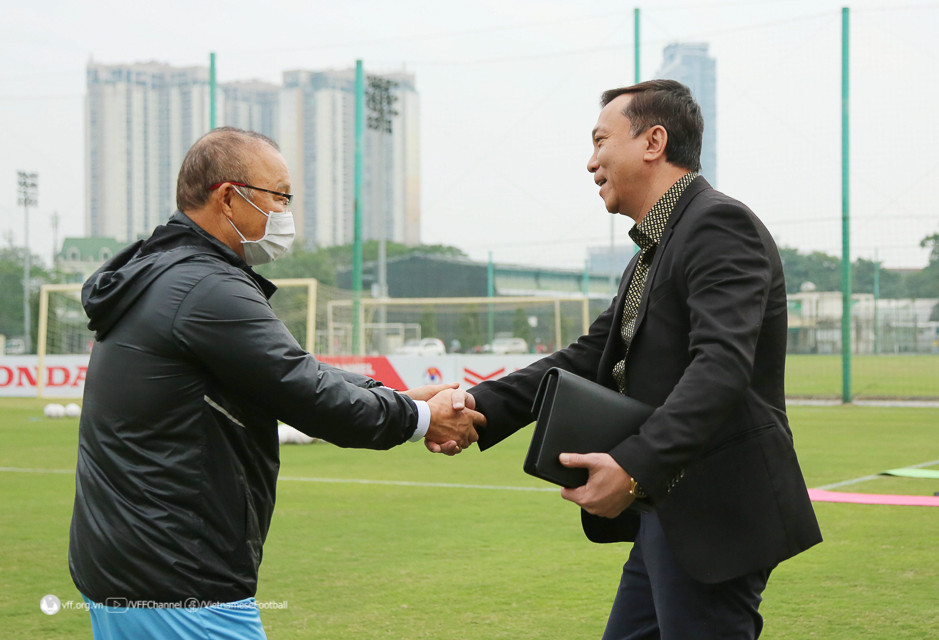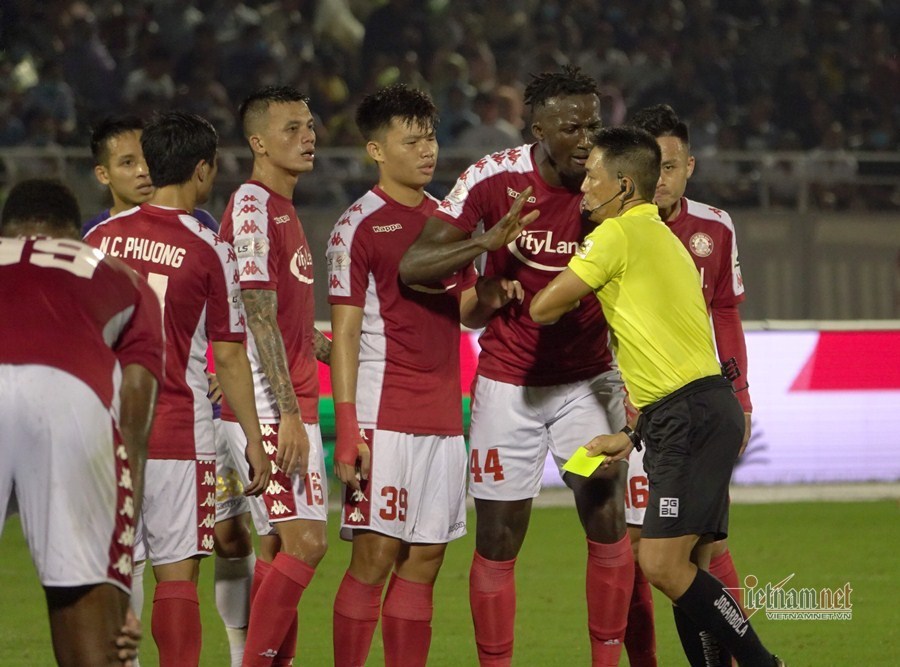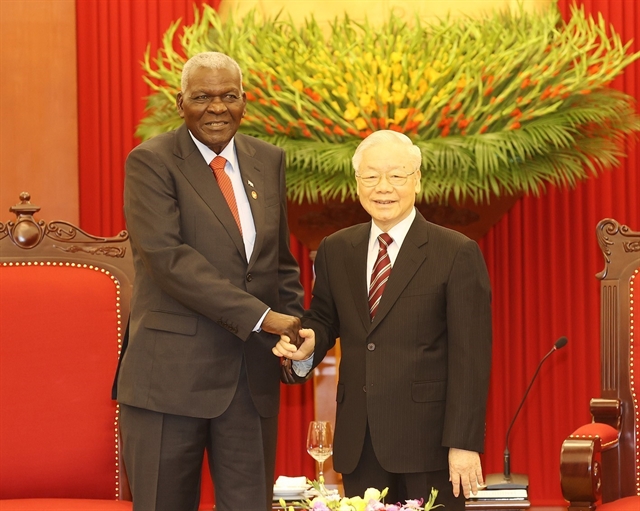 |
| Transport minister Nguyễn Văn Thắng at the meeting. — VNA/VNS Photo |
HÀ NỘI — The Ministry of Transport (MoT) will continue to closely coordinate with the Ministry of Public Security to review and refine the draft Law on Roads and the draft Law on Road Traffic Safety and Order, ensuring consistency, avoiding duplication, and facilitating the application of laws.
Minister Nguyễn Văn Thắng made this statement on Friday during parliamentary discussions on the matter.
During the debate, the majority of deputies agreed on the separation of the 2008 Road Traffic Law into two laws.
Road traffic order and safety will come under security, order, safety, and society; while the construction, development and management of road traffic infrastructure, transport management and road transport support services will belong to the economic and technical sector.
However, according to delegate Nguyễn Hải Dũng from Nam Định Province, there are still many difficulties in building these two laws, and it is necessary to make a clear distinction for the transition to one law or for coexistence between two laws.
Regarding the land fund allocated for road traffic infrastructure, transport minister Thắng said that this regulation had been revised and supplemented to ensure feasibility.
The draft law adds provisions for special areas to ensure the land fund ratio according to general regulations, taking into account the need to preserve historic urban areas and urban areas in mountainous regions, border and island areas, and areas with challenging terrain.
Regarding the financial sources for investing in the construction, management, operation, and maintenance of road infrastructure, there is a suggestion to assess the necessity of supplementing tolls for the use of expressways in addition to the tolls for using roads through vehicles.
Thắng said the ministry had undertaken a study on toll collection for expressways invested by the State, analysing and evaluating the impacts in cases of toll collection and non-toll collection for State-invested expressways.
To ensure the appropriateness between the fee level and the quality of services enjoyed by users, the draft law had included provisions based on the principle that people using higher-quality services would have to pay a higher fee. Users also have the right to choose parallel routes.
The fee levels would be determined for each expressway to ensure suitability for the operational conditions of each region and in line with the quality of services. This would ensure that the State receives returns from its investments to reinvest in infrastructure, including annual costs, and balances the interests of both the citizens and the State.
"At present, toll collection through vehicles only meets 35-40 per cent of the maintenance needs. Therefore, if the expressway system is constructed and completed without tolls, the maintenance budget will be significantly deficient, posing substantial challenges," the minister said.
Regarding the general regulations for expressways, Thắng said that the draft law had stipulated that the investment in expressways must be comprehensive, including phased investment in expressways. Specific requirements for phased investment in expressways would be researched and regulated by the Ministry of Transport in the national standards for expressway design.
The minister also said that based on the practical experience of investing in transportation infrastructure, land clearance had consistently been a complex issue, leading to complaints, slow progress, and overinvestment.
Additionally, policies and compensation rates were frequently adjusted. Supplementary land clearance for expansion within a complex plan incurred significantly higher costs compared to a single clearance effort.
The head of the Transport Ministry emphasised that for expressways, it was essential to invest in a comprehensive system of access roads and side roads.
Learning from practical problems, in the Resolution on investment policies for a number of expressway projects, the National Assembly had stipulated that site clearance should be a one-time effort following a specific scale and plan.
In the field of road transportation, minister Thắng said that according to the draft Law on Road, the application of software to support the connection of car transportation was not considered a transportation business activity.
Only when an organisation or an individual provides software services to support road transportation by car and engages in at least one of the vehicle management and driving stages, or makes decisions regarding transportation fares for the purpose of profit, would it be considered a transportation business activity.
On the same day, the National Assembly approved the Law on Telecommunications (revised).
The document sailed through the legislature with 473 yes votes, or 94.74 per cent of the NA deputies.
Earlier, legislators opined on the exemption and reduction of financial contributions by businesses to the Vietnam Public-Utility Telecommunication Service Fund, along with telecom resources, and telecom auctions. — VNS
(责任编辑:Thể thao)
 The Masters 2019 vòng 1: Tiger Woods ra quân ấn tượng
The Masters 2019 vòng 1: Tiger Woods ra quân ấn tượng Tin chuyển nhượng 25
Tin chuyển nhượng 25 VFF tìm HLV giỏi giúp tuyển Việt Nam dự World Cup
VFF tìm HLV giỏi giúp tuyển Việt Nam dự World Cup Điểm nhấn vòng 11 V
Điểm nhấn vòng 11 V'Hương vị tình thân' tập 95: Long giúp Nam xác nhận ông Sinh là bố đẻ
 Ở cuối tập 94, Nam (Phương Oanh) tới nhà ông Sinh và vô tình phát hiện ra những kỷ vật liên quan đến
...[详细]
Ở cuối tập 94, Nam (Phương Oanh) tới nhà ông Sinh và vô tình phát hiện ra những kỷ vật liên quan đến
...[详细]Bị trả lương thấp hơn so với hợp đồng, NLĐ cần làm gì?
 - Phòng Nội vụ huyện được UBND huyện ủy quyền ký hợp đồng lao động đối với sinh viên ra trường làm v
...[详细]
- Phòng Nội vụ huyện được UBND huyện ủy quyền ký hợp đồng lao động đối với sinh viên ra trường làm v
...[详细] - Chelsea đang tiến rất gần đến hai bản hợp đồng trị giá lên đến 100 triệu bảng với bộ đôi hậu vệ xu
...[详细]
- Chelsea đang tiến rất gần đến hai bản hợp đồng trị giá lên đến 100 triệu bảng với bộ đôi hậu vệ xu
...[详细]U22 Việt Nam tập trung, khó mới cậy tài HLV Park Hang Seo rèn quân
Party General Secretary Trọng welcomes Cuban NA President, highlighting long
 Party General Secretary Trọng welcomes Cuban NA President, highlighting long-standing friends
...[详细]
Party General Secretary Trọng welcomes Cuban NA President, highlighting long-standing friends
...[详细]Lịch thi đấu bóng đá Ngoại hạng Anh vòng 5
 NgàyGiờTrận đấuKênh trực tiếp31/81h30Crystal Palace 1-1 BrentfordK+CINE1h30Fulham 2-1 B
...[详细]
NgàyGiờTrận đấuKênh trực tiếp31/81h30Crystal Palace 1-1 BrentfordK+CINE1h30Fulham 2-1 B
...[详细] Video AFF Cup 2022 Việt Nam 3-0 Myanmar (nguồn: FPT Play)Ghi bàn:Việt Nam: Zin Lwin Kyaw (8',
...[详细]
Video AFF Cup 2022 Việt Nam 3-0 Myanmar (nguồn: FPT Play)Ghi bàn:Việt Nam: Zin Lwin Kyaw (8',
...[详细] - Raphael Varane vừa bóng gió rằng anh cảm thấy không thoải mái ở Real Madrid. Điều này mang đến tin
...[详细]
- Raphael Varane vừa bóng gió rằng anh cảm thấy không thoải mái ở Real Madrid. Điều này mang đến tin
...[详细]Quảng Nam dự chi gần 34 tỷ đồng nâng cấp hạ tầng CNTT
Hồi âm đơn thư Bạn đọc cuối tháng 4/ 2014
 -Nửa cuối tháng 4/2014, Báo VietNamNet tiếp tục nhận được đơn thư Bạn đọc và phúc đáp của các cơ qua
...[详细]
-Nửa cuối tháng 4/2014, Báo VietNamNet tiếp tục nhận được đơn thư Bạn đọc và phúc đáp của các cơ qua
...[详细]